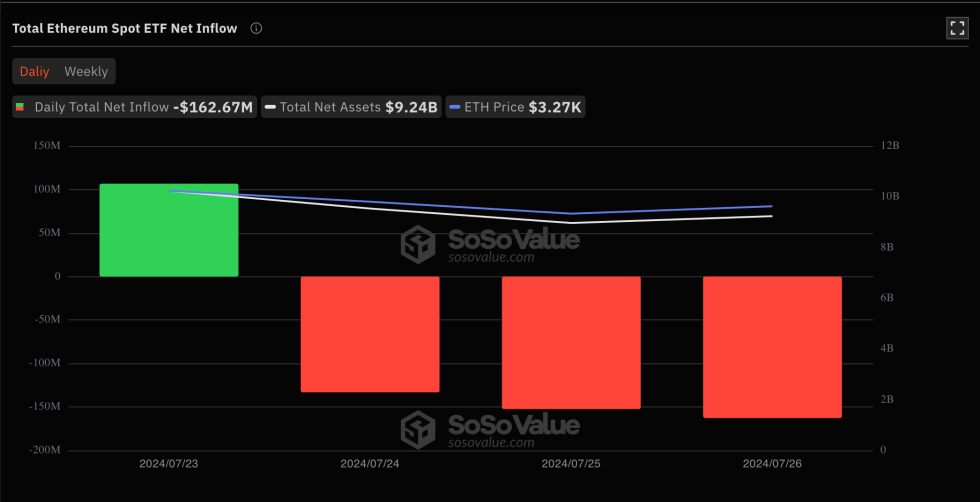Following its unexpected approval by the United States Securities and Exchange Commission (SEC), the spot Ethereum ETFs (exchange-traded funds) became one of the most important narratives in the cryptocurrency space. However, the crypto investment products seem not to be living up to the hype after an underwhelming trading debut in the past week.
Grayscale Responsible For Heavy Spot Ethereum ETF Outflows
On Friday, 26th of July, the recently-launched spot Ethereum ETFs posted another day of significant outflows, marking the third consecutive day of withdrawals from these products. The exchange-traded products, which launched on Tuesday, July 23, recorded a net outflow of roughly $341 in the opening week.
According to data from SoSoValue, the spot Ethereum ETF market launched on a high note, posting a net inflow of approximately $106.8 million on day one. This first-day performance was deemed a “solid start” by market experts, especially in comparison to the launch of the Bitcoin ETFs earlier in the year.
However, the spot Ethereum ETFs followed up with a “red day”, with over $133 million flowing out of the products on Wednesday, July 24. This was also followed by $152 million and $162 million net outflows on Thursday, July 25, and Friday, July 26, respectively.

Source: SoSoValue
It is worth noting that Grayscale’s ETH Trust exchange-traded fund ETHE, specifically, has been responsible for a significant percentage of the capital outflow. On Friday, the fund saw a single-day outflow of over $356 million. Since the spot Ethereum ETFs, the Grayscale product has recorded a cumulative net inflow of $1.51 billion.
Interestingly, the price of Ethereum has largely struggled following the launch of the Ether ETFs. According to data from CoinGecko, the “king of altcoins” has declined in value by more than 7% in the past week. As of this writing, the ETH price stands at around $3,248, reflecting a 1.1% dip in the past day.
New Money Inflow Less Impactful On ETH
According to CryptoQuant’s latest report, the influx of fresh capital, such as ETFs, has a less significant impact on Ethereum than on Bitcoin. This observation is based on a metric called the “realized capitalization multiplier.”
Recent data shows each dollar of fresh money invested in Bitcoin has the potential to increase BTC’s market capitalization by $5. Meanwhile, the effect is much lower for Ether, whose market cap would only increase by $1.3 for each invested dollar.
In 2024, every $1 invested in #Bitcoin increased its market cap by $5, while for ETH, it was only $1.3.
New money flows have a weaker effect on $ETH than Bitcoin. pic.twitter.com/CtAmmMVL8g
— CryptoQuant.com (@cryptoquant_com) July 26, 2024
This revelation suggests that ETH’s multiplier effect has been significantly lower than that of Bitcoin so far in 2024.




